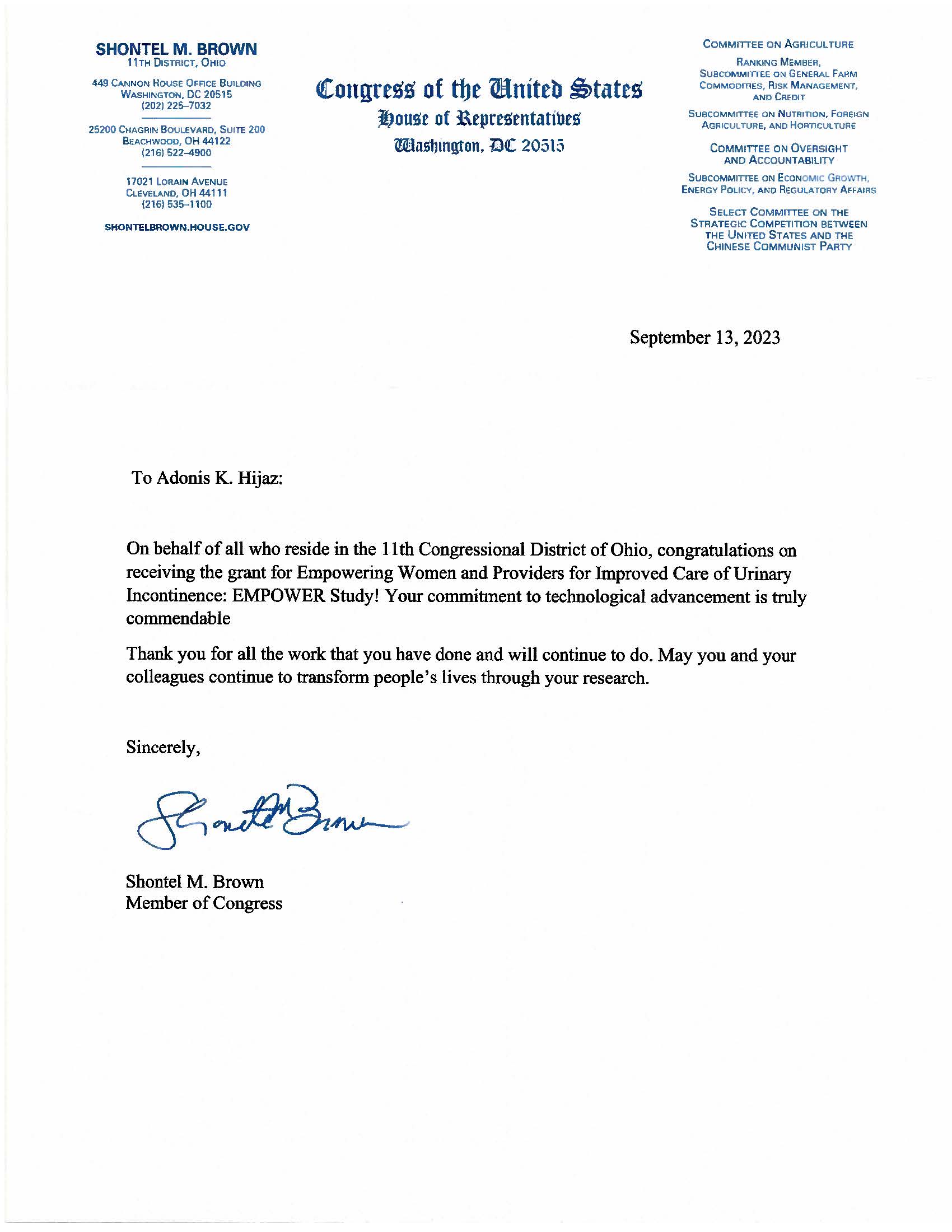Novel EMPOWER Study of Female Urinary Incontinence Reaches Halfway Point
December 02, 2023
Innovations in Urology | Fall 2023
Now at its one-year mark, University Hospitals’ EMPOWER study is reimagining the management of female urinary incontinence (UI) in the primary care setting. This spring, the novel initiative received national attention when it was highlighted in Urology Times®. David Sheyn, MD, Division Chief of Female Pelvic Medicine at University Hospitals Urology Institute, provided a video overview of the project’s overarching goals.
 David Sheyn, MD
David Sheyn, MDFunded by a $3 million grant from the Agency for Healthcare Research and Quality (AHRQ), EMPOWER is led by the University Hospitals Urology Institute in collaboration with UH Primary Care Institute (PCI), UH Population Health and Case Western Reserve University. Industry partners for the project include Renalis Health and ECHO Chicago. Researchers are conducting large-scale screenings of female patients (ages 18 and older) within PCI’s integrated network of 109 outpatient primary care practices throughout Northeast Ohio.
An Underserved Patient Population
“Women are two times more likely to experience urinary incontinence than men,” says Elisar Khawam, EMPOWER Project Manager and Clinical Research Coordinator II at UH Urology Institute. “However, once women identify that they have symptoms, they usually wait six and a half years before seeking professional help.” Too often, women with UI are hesitant to discuss symptoms, or attribute the disruptive condition to aging. When they do speak up, the average delay from diagnosis to treatment is four years.
Rethinking Care Pathways
The innovative study design addresses the time limitations and competing priorities of busy primary care offices that may be barriers to UI treatment. During appointment check-ins, patients are offered a brief incontinence questionnaire. Individuals who self-report symptoms and enroll in the trial are randomized to one of the three study arms:
- First arm — standard care
- Second arm — standard care plus support from a nurse navigator via virtual visits
- Third arm — standard care, nurse navigator and daily interaction with Renalis Health’s CeCe®, an artificial intelligence-based platform that utilizes texting and scripted responses
Following the eight-week intervention, individuals are discharged if symptoms improve, or are escalated to urogynecology or female urology if symptoms persist.
 On September 16, 2023 The EMPOWER Study team received recent commendations from Congresswoman Shontel Brown, 11th District, Ohio.
On September 16, 2023 The EMPOWER Study team received recent commendations from Congresswoman Shontel Brown, 11th District, Ohio.Onboarding Primary Care Offices
Researchers started onboarding physician offices in communities west of Cleveland in summer 2022. Additional phases have included regions to the south and east, ultimately encompassing a 16-county service area and a diverse cross-section of socioeconomic and ethnic backgrounds. To date, 8,000 women have been screened and 250 have joined one of the three arms of the study.
“As we reach EMPOWER’s halfway mark, implementation of the study is moving successfully due to the efforts of the team we gathered within the Urology Institute, as well as our collaborators at Case Western Reserve University,” says Principal Investigator Adonis Hijaz, MD, Vice Chairman of the Department of Urology at UH Cleveland Medical Center and Lester Persky Professor of Urology at Case Western Reserve University School of Medicine. “More importantly, the support we have received from Dr. George Topalsky, prior president of PCI, and the primary care providers, office managers and front desk staff is making the initiative possible. The response has been positive on all levels.”
An additional component of the study aims to increase provider education and confidence in offering best-practice care to patients with UI. Primary care providers and nurse navigators involved in EMPOWER have the opportunity to participate in eight one-hour training sessions through Project ECHO, an expert-facilitated healthcare telementoring program.
Early Results and Next Steps
Preliminary findings indicate that patients receiving nurse navigator support report symptom improvement at a much higher rate over the eight-week period than patients who are receiving standard care. “Most notably, we have learned that of the 8,000 women who have been screened, well over 50 percent report at least one symptom of urinary incontinence,” says Khawam. “It just goes to show that half of the women who are coming into these primary care clinics are affected by UI and may benefit from appropriate care.”
The third and final wave of the EMPOWER study began enrolling in early November and will run through April 2024. The official end of the study is considered six months after this date in October 2024. The team looks forward to continued data analysis and future publications/presentations through AHRQ and other national outlets.
For more information on the EMPOWER study, please contact Dr. Hijaz at Adonis.Hijaz@UHhospitals.org or Elisar Khawam at Elisabbr.Khawam@UHhospitals.org.
Learn more about research initiatives taking place at University Hospitals Urology Institute.
Contributing Experts:
Adonis Hijaz, MD
Vice Chair of Academics and Research
Senior Distinguished Physician
University Hospitals Urology Institute
Lester Persky Professor of Urology
Case Western Reserve University School of Medicine
Elisar Khawam
EMPOWER Project Manager
Clinical Research Coordinator II
University Hospitals Urology Institute


